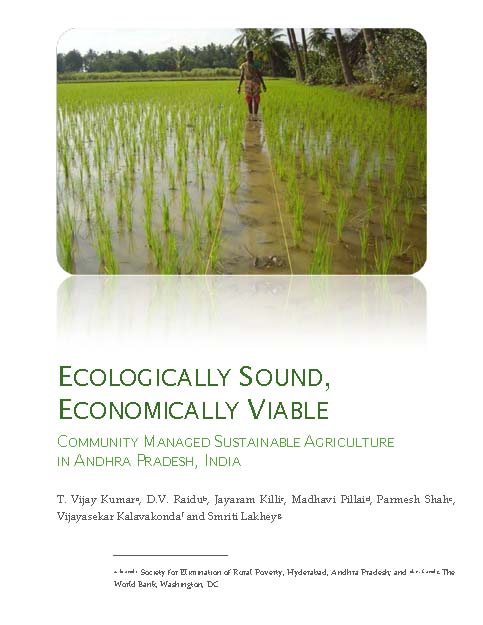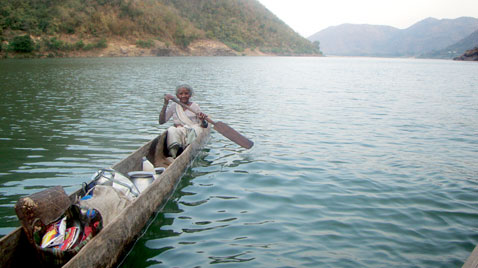/regions/andhra-pradesh
Andhra Pradesh
Fluorosis in an urban slum area of Nalgonda - Andhra Pradesh - An epidemiological study - Indian Journal of Public Health
Posted on 07 Jun, 2011 10:09 AM.
Flouride problem in Guttavarepalle village, Madanapalle, Andhra Pradesh - A field report by Arghyam and Outreach
Posted on 31 May, 2011 12:07 PM
Overview
It is surprising that fluoride was found even in surface water bodies like ponds, because fluoride is generally found in deep aquifers. Fluoride is a naturally occurring mineral in the deeper layers of rock beneath the earth's surface, so it was unusual to find it at such high levels even in surface water sources, leading to the conclusion that intensive agriculture in the area has spread the fluoride to the surface.
Groundwater management in Andhra Pradesh - Time to address real issues – A report by Institute for Resource Analysis and Policy
Posted on 17 May, 2011 02:16 PMWith 49 per cent of the total irrigation from groundwater, the state of Andhra Pradesh accounts for 5.3 per cent of the net groundwater irrigated area in the country.
Water quality in Penukonda region of Anantapur district - A field report by Arghyam
Posted on 16 May, 2011 06:23 PMIntroduction
SEDS approached Arghyam to seek advice on the quality of drinking water in the area. Anantpur is the second most drought-prone area in India, and a lot of work has been done to deal with the water supply situation by the Government of Andhra Pradesh as well as NGOs and charities such as SEDS and the Sai Baba Trust, to name a few. There seems to be an adequate supply of water in the district, but very little or no attention has been paid to the quality of water.
Ecologically sound, economically viable community managed sustainable agriculture in Andhra Pradesh – A report by Society for Elimination of Rural Poverty and World Bank
Posted on 15 May, 2011 09:56 PM This report by Society for Elimination of Rural Poverty and World Bank deals with Community Managed Sustainable Agriculture (CMSA) in Andhra Pradesh. The paper also analyses the initial results of economic and environmental impact of CMSA, distills the key lessons learned from the Andhra Pradesh experience, and draws possible implications for future.
This report by Society for Elimination of Rural Poverty and World Bank deals with Community Managed Sustainable Agriculture (CMSA) in Andhra Pradesh. The paper also analyses the initial results of economic and environmental impact of CMSA, distills the key lessons learned from the Andhra Pradesh experience, and draws possible implications for future.
To address the adverse impacts of green revolution, the alternative approach to manage agriculture i.e., CMSA is being tested and practiced in the State. The CMSA approach replaces the use of chemical pesticides with a combination of physical and biological measures—including eco-friendly bio-pesticides—and complements it by adopting biological and agronomic soil fertility improvement measures leading to reduced use of chemical fertilizers.
Estimation of groundwater resources in Andhra Pradesh - A report by the State Groundwater Department - GoAP (2002)
Posted on 14 May, 2011 05:19 PMThe sustainable development and management of the resource requires precise quantitative assessment based on valid scientific principles. The updated Groundwater Estimation Committee methodology – 1997 has been used and detailed guidelines were formulated through discussions and deliberations in the State Level Groundwater Estimation Committee.
Groundwater management in a coastal aquifer in Krishna River Delta – A paper in Current Science
Posted on 10 May, 2011 08:03 AMGroundwater conditions in the multi-aquifer system in the delta, were studied through an integrated approach using hydrochemical, hydrogeological and isotopic techniques. This study was taken up because of the reported seawater intrusion into the groundwater system of this agriculturally rich region.
Polavaram fraud - The Polavaram dam on the Godavari could displace 400,000 people and submerge nearly 4,000 hectares of forest land - Article from Down To Earth
Posted on 06 May, 2011 08:33 PMMost of the people threatened to be displaced cannot be relocated until their rights over forestland are recognized under the Forest Rights Act. How did the Andhra Pradesh government meet this immense challenge? It quietly told the Union environment and forests ministry that all claims have been settled.
The ministry gave forest clearance to the project last year. Now over 50 villages have written to the ministry, saying their forest rights have not been settled. Richard Mahapatra visited the villages and found the state had indeed lied.
Following similar complaints, the ministry had scrapped Vedanta’s proposal to mine Niyamgiri hills and withheld forest clearance to the POSCO steel plant in Odisha. Will it apply the same yardstick to Polavaram?
 Residents of Teladibbalu did not know they had forest rights. The village is in the dam’s submergence zone and accessible only by boat. (Photo: G Srinivas).
Residents of Teladibbalu did not know they had forest rights. The village is in the dam’s submergence zone and accessible only by boat. (Photo: G Srinivas).
WASSAN is looking for Technical Officer (Fisheries), at Khammam district (Andhra Pradesh) – Apply by 30th April, 2011
Posted on 28 Apr, 2011 01:00 PMContent courtesy: DevNetJobsIndia
Watershed Support Services and Activities Network (WASSAN) is an autonomous support organization, working to promote NRM based livelihoods in rain fed areas. WASSAN mainly focuses on capacity building, technical support and policy advocacy through its various projects funded by Government, national and international donors and other agencies. WASSAN is looking for Technical Officer(s) to work for the inland tank based fisheries in rainfed areas.
Assessing acute Gastroenteritis risks associated with water quality and sanitation in Hyderabad city - A paper by the Institute of Health Systems (IHS)
Posted on 19 Apr, 2011 11:35 PMThe quality of drinking water is a vital element of public health and well-being. The most effective means of consistently ensuring the safety of a drinking-water supply is through the use of a comprehensive risk assessment and risk management approach that encompasses all steps in water supply from catchment to consumer.
WHO guidelines on water quality term these approaches as water safety plans (WSPs), developed to organize, systematize and apply management practices in drinking-water quality.